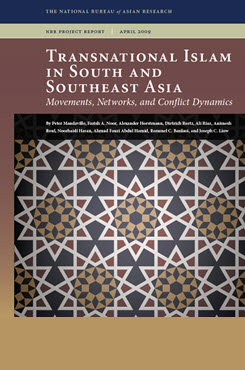From Transnational Islam in South and Southeast Asia: Movements, Networks, and Conflict Dynamics
Migrants, Mujahidin, Madrassa Students
The Diversity of Transnational Islam in Pakistan
This paper explores the diversity of transnational Islam in Pakistan.
EXECUTIVE SUMMARY
This paper explores the diversity of transnational Islam in Pakistan. The paper argues that most of Pakistan’s transnational Islamic actors are tied to economic, cultural and religious forms of globalization. The radical and militant forms of transnational Islam in the country are largely driven by factors directly linked to Pakistan’s political and security apparatuses. It is suggested that the increase in militant activities in Pakistan stems from the reluctance or inability of Pakistan’s government to introduce firm standards of law and civility. The paper contends that networks centered on Islamic scholarship or Pakistan’s identity, are not per se violent or threatening, but reflect the religious, cultural and ethnic concerns of an expanding global diaspora of South Asian Muslims.
MAIN FINDINGS
Pakistan has become a major hub of transnational Islam in the region with intense in- and outbound activity rooted in its culture, history and politics. Pakistan’s transnational Islamic actors largely emanate from competition between distinct religio-cultural milieus, the most important of which are the Deobandis, the Barelwis, Jama’at-i Islami, the Ahl-i Hadith, the Ahmadiyya and the Muhajirs. Transnational Islam in Pakistan can be distinguished by the different types of religio-political issues it pursues: 1) security and ideology, 2) religious mobilization, and 3) Pakistani nationalist identity. Mainly group one constitutes an abiding threat. The unstable, charged and polarized nature of the overall political framework in Pakistan pushes many transnational actors into the political, extremist and even militant realm. Currently, the major threat to the stability of Pakistan comes from sectarian and jihadi groups that spin out of control from state and religious patronage. The doctrines and politics of sectarianism as expressed in the antagonism between various Pakistani Islamic groups in the struggle for the “true” Islam have heavily contributed to the radicalization of transnational Islamic actors in the country. Religio-cultural networks focused on madrassas (Deobandis, Barelwis), missionary work (Tablighis, Da’wat-i Islami) or political mobilization (Jama’at-i Islami) have their own rationale of expansion and do not necessarily pose threats.
POLICY IMPLICATIONS
- Pakistan cannot successfully fight the Pakistani Taliban as long as some elements in the administration hope to keep intact this militant network for operation against India and the Karzai government. Neither can Pakistan achieve success as long as it does not address the tribal dimension of this warfare successfully since much of current Taliban operations reflect long-standing disaffected and marginalized tribal concerns.
- The Pakistani state needs to resurrect its civil authority and regulate civil institutions without discriminating against them. It will further have to focus on the social rehabilitation and development of disaffected communities giving rise to militant Islam, with education, employment and social amenities holding prime importance.
- Pakistan and international agencies should be discouraged from punishing transnational actors of Islam for their efforts of religious mobilization as such behavior appears to be counterproductive.
- While some political analysts believe that the madrassa system is one major source of instability, religious education will always have to remain religious in nature. Educational standards can only be improved by lifting Pakistani public education in a major way.


